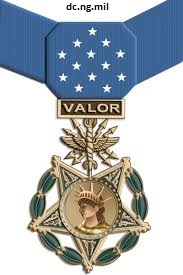WWII-MI-McCall, Thomas E.


TFH 1/22: Staff Sergeant Thomas E. McCall, USA (IN-ARNG)
Thomas Edward McCall was born in Burton, Kansas on May 9, 1916. He later relocated with his parents and family to Indiana, where they settled in Attica. McCall joined the Indiana National Guard in the 1930s, and was federalized for wartime service with the United States Army in 1942.
McCall was placed with the 36th Infantry Division in Company F, 2nd Battalion, 143rd Infantry Regiment. The division saw its first action during the Italian Campaign in 1943. On January 20, 1944, the 36th launched an ill-fated attempt to establish a bridgehead across the Rapido (Gari) River as part of the assault against the Nazi defenses known as the Winter or "Gustav" Line. This was the beginning of the Battle of Monte Cassino, which would rage for over four months.
2-143 Infantry managed to make the river crossing, but wound up being cut-off without support. The gallant soldiers fought desperately against the German opposition as many of their numbers were wounded, killed, or captured by the enemy.
Staff Sergeant Thomas McCall was leading his machine gun section when they came under intense fire that caused most of the section to become casualties and damaged or destroyed their weapons. Before long, McCall was the last man standing, and he took the section's one remaining M1919 machine gun on a solo charge, firing the powerful weapon from the hip, against three enemy machine gun nests, destroying two of them and resulting in his capture while attacking the third under withering enemy fires.
McCall's charge was later recognized with the award of the Medal of Honor.
McCALL, THOMAS E.
Rank and organization: Staff Sergeant, U.S. Army, Company F, 143d Infantry, 36th Infantry Division
Place and date: Near San Angelo, Italy, 22 January 1944
Entered service at: Veedersburg, Ind.
G.O. No.: 31, 17 April 1945
Citation: For conspicuous gallantry and intrepidity at risk of life above and beyond the call of duty. On 22 January 1944, Company F had the mission of crossing the Rapido River in the vicinity of San Angelo, Italy, and attacking the well-prepared German positions to the west. For the defense of these positions the enemy had prepared a network of machinegun positions covering the terrain to the front with a pattern of withering machine gun fire, and mortar and artillery positions zeroed in on the defilade areas. S/Sgt. McCall commanded a machinegun section that was to provide added fire support for the riflemen. Under cover of darkness, Company F advanced to the river crossing site and under intense enemy mortar, artillery, and machinegun fire crossed an ice-covered bridge which was continually the target for enemy fire. Many casualties occurred on reaching the west side of the river and reorganization was imperative. Exposing himself to the deadly enemy machinegun and small arms fire that swept over the flat terrain, S/Sgt. McCall, with unusual calmness, encouraged and welded his men into an effective fighting unit. He then led them forward across the muddy, exposed terrain. Skillfully he guided his men through a barbed-wire entanglement to reach a road where he personally placed the weapons of his two squads into positions of vantage, covering the battalion's front. A shell landed near one of the positions, wounding the gunner, killing the assistant gunner, and destroying the weapon. Even though enemy shells were falling dangerously near, S/Sgt. McCall crawled across the treacherous terrain and rendered first aid to the wounded man, dragging him into a position of cover with the help of another man. The gunners of the second machinegun had been wounded from the fragments of an enemy shell, leaving S/Sgt. McCall the only remaining member of his machinegun section. Displaying outstanding aggressiveness, he ran forward with the weapon on his hip, reaching a point 30 yards from the enemy, where he fired 2 bursts of fire into the nest, killing or wounding all of the crew and putting the gun out of action. A second machinegun now opened fire upon him and he rushed its position, firing his weapon from the hip, killing 4 of the gun crew. A third machine gun, 50 yards in rear of the first two, was delivering a tremendous volume of fire upon our troops. S/Sgt. McCall spotted its position and valiantly went toward it in the face of overwhelming enemy fire. He was last seen courageously moving forward on the enemy position, firing his machine gun from his hip. S/Sgt. McCall's intrepidity and unhesitating willingness to sacrifice his life exemplify the highest traditions of the Armed Forces.
McCall was interned as a prisoner of war by the Nazis. He survived captivity for sixteen months until his liberation from Stalag 3B in 1945. McCall was accepted into the Regular Army after World War II in November 1945 and he continued serving, including duty during the Korean War where he was wounded in action. He eventually attained the rank of Master Sergeant.
In addition to the Medal of Honor, McCall also was decorated with the Silver Star and Bronze Star Medal for combat heroism.
On September 19, 1965 while enjoying a fishing trip with his eight year old son, Thomas E. McCall, Jr., on the Susquehanna River north of Washington, DC, the McCall's boat was capsized by an unexpected rush of water from a opened river lock. As the boy struggled in the rushing water, the elder McCall kept his son's head above the torrent so he could breathe. Another boat arrived on scene and pulled McCall's son to safety but was too late to save the elder McCall from drowning.
He was laid to rest at the Spring Vale Cemetery in Lafayette, Indiana. An acquaintance from Attica, Indiana summed McCall's end best: "His last act on earth was as a hero."
Thomas E. McCall was 49 years old at his death.
Originally Posted by Allan Bourdius at the source link above.


